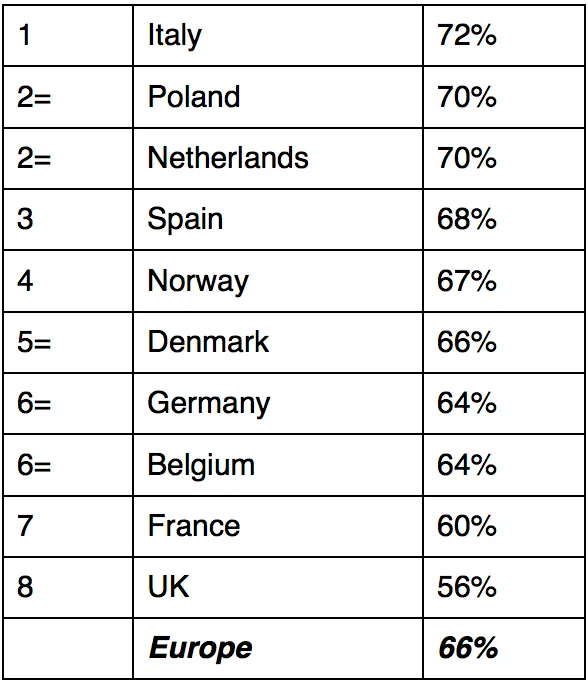In brief
- 66% of European believe that cryptocurrencies will still exist in ten years’ time according to a survey by bitFlyer Europe.
- The highest level of confidence was in Italy, with 72%.
- Across Europe, confidence in cryptocurrencies has increased 3% versus 2019 survey results.
Two-thirds of people in Europe believe that cryptocurrencies will still exist in ten years’ time, according to a survey of 10,000 citizens by Bitcoin exchange bitFlyer Europe.
Its annual Crypto-Confidence Index for 2020, published today, also found that Italians are the biggest believers, at 72%—while the UK is the least confident at 56%.
Impact of the coronavirus crisis
The survey was conducted in March, as panic about the COVID-19 pandemic was at its height. Countries introduced quantitative easing, and volatility hit the value of assets—both traditional and digital. Around this time, stocks were falling and the price of Bitcoin dropped 50% from $9,000 to $4,500.
Despite this, confidence in cryptocurrencies across Europe has increased 3% versus the 2019 results. Respondents in nine out of the ten countries polled were more confident.

Italy has the most believers
At the start of the outbreak, Italy was badly hit by the coronavirus. It was one of the first countries to see widespread lockdowns in place as the country struggled to deal with it. It also saw a fall in confidence in the European Union’s willingness to help its struggling economy.
This may help to explain why Italy has the biggest proportion of citizens (12%) which believes that cryptocurrencies will one day be used as mainstream currency, a two percent increase from last year.
Conversely, only five percent of UK respondents believe in the potential of cryptocurrencies as mainstream currencies.
Notably, the UK is the only country, other than Norway, in which population confidence in the future of cryptocurrencies decreased, and neither country relies on the Euro.
“Countries like Italy which have been hit hard by the COVID-19 crisis are expressing more faith than ever in cryptocurrencies,” said Andy Bryant, chief operating officer at bitFlyer Europe. “As people face economic hardship, we can expect populations to seek alternatives to traditional financial systems. This is an important time for the crypto industry to demonstrate how cryptocurrencies and associated concepts such as decentralized finance can provide attractive alternatives or even substitutes for incumbent economic models.”
The March 2020 poll also found that almost one in 10 (nine percent) of Europeans believe Bitcoin will be fully ingrained into society as a form of currency in 10 years’ time, whilst nine percent believe it will be used as a security or investment. A quarter of those polled were unsure how cryptocurrencies might be used in the future.
The Bitflyer survey appears to contradict a recent survey from Austria’s ING Bank, conducted in August, which found weakening confidence in Bitcoin (with the exception of Turkey).
But it’s Italy where citizens seem most receptive to cryptocurrencies. And the search for non-traditional currencies has already started.
Earlier this week, a small Italian town even began minting banknotes called Ducatis in a bid to help struggling locals.
Los "Ducati", la moneda que ha puesto a circular la localidad italiana de Castellino del Biferno. https://t.co/i3c9Ie3xoo pic.twitter.com/ndg2kOr6hR
— SoyMotero.net (@soymotero) April 28, 2020
Castellino del Biferno, in the mountainous north of the country, has just 550 residents. It’s handing the ‘Ducati’ notes out to residents based upon their economic needs, and is targeting the elderly—identified as the group needing the most help understanding the new currency.
Maybe that will help them understand Bitcoin, if the need arises.

